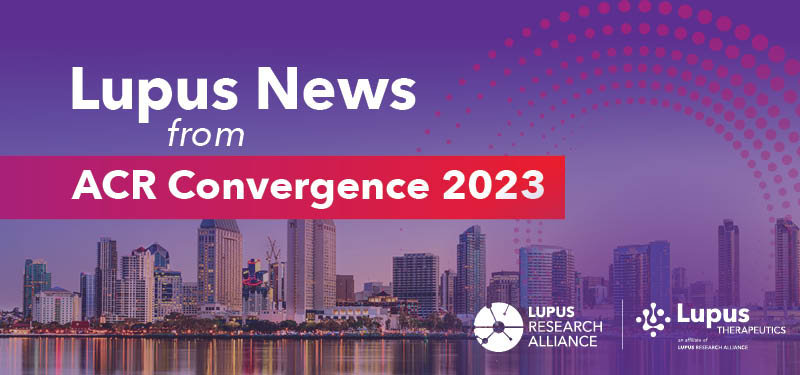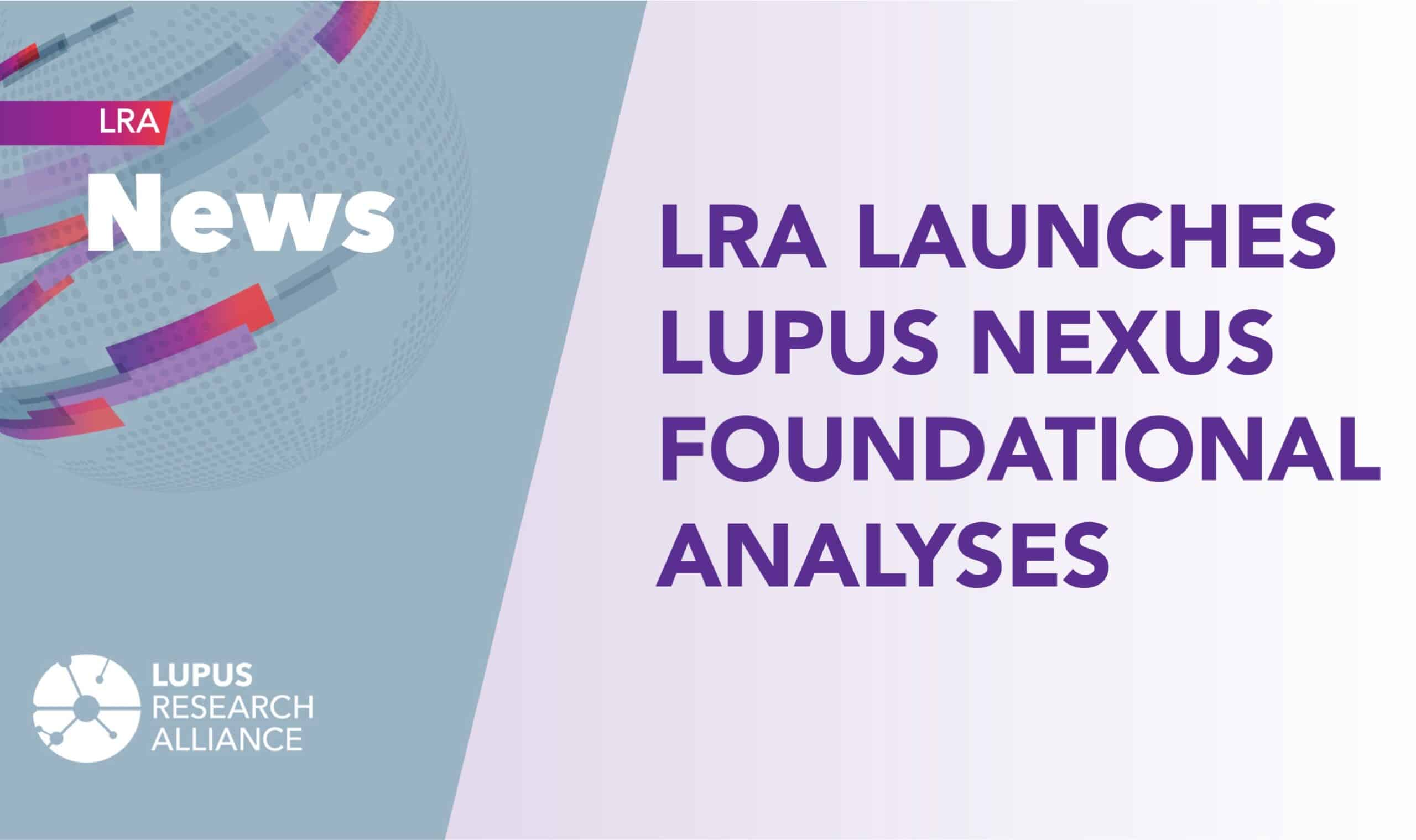LRA Highlights Groundbreaking Lupus Research at ACR Convergence 2023

LRA Highlights Groundbreaking Lupus Research at ACR Convergence 2023
This information is brought to you by the Lupus Research Alliance and Lupus Therapeutics and is not sponsored by, nor a part of, the American College of Rheumatology.
- 30+ presentations of studies funded by the LRA spanning a broad spectrum of research areas
- Positive results from Phase 2/3 clinical studies supported by LRA affiliate Lupus Therapeutics point to potential new treatments
- Lupus Therapeutics’ PALS Program helps overcome challenges of diverse lupus patient trial participation
The Lupus Research Alliance (LRA), the largest non-governmental non-profit funder of lupus research worldwide, is pleased to announce results from more than 30 studies supported by the LRA and its clinical research affiliate Lupus Therapeutics will be presented at ACR Convergence 2023, the annual meeting of the American College of Rheumatology.
Studies will represent the full continuum of research that the LRA and Lupus Therapeutics support, from innovative foundational research to lupus clinical trials evaluating potential new treatments.
“The LRA and Lupus Therapeutics are extremely proud of the tremendous work we have supported that will contribute to the dynamic scientific dialogue at this important rheumatology meeting,’ commented LRA President and CEO Albert T. Roy. “We also look forward to many presentations of exciting clinical research, including results from CAR-T cell therapy studies that built on pioneering work funded by the LRA and have the potential to shift the lupus treatment paradigm.”
FOUNDATIONAL RESEARCH FUNDED BY THE LRA
LRA-funded investigators will be presenting their recent breakthroughs across a broad spectrum of lupus research, including the impact of lupus on various organs such as the skin, kidney, and brain, the contribution of the gut microbiome to lupus, dysregulation of a variety of immune cell types underlying lupus, and more.
ORAL PRESENTATIONS
Sunday, Nov. 12
APOL1 High Risk Genotype in SLE: A Genes in Context Story
Abstract # NA, 12:00 PM – Room 11A-B
ROCK1 Orchestrates B-cell Differentiation Under Stress
Abstract #0729, 2:30 PM – Room 30D-E
Lupus Nephritis Flares Linked to Platelet Activation During Gut Pathobiont Blooms
Abstract #0851, 5:00 PM, Exhibit Hall A-B
Monday, Nov. 13
CXCL13+ T cell differentiation in systemic lupus erythematosus is controlled by opposing effects of aryl hydrocarbon receptor and type I interferon
Abstract #1580, 11:15 AM – Exhibit Hall A-B
Metabolic Mechanisms that Control Inflammation and Immune-related Disorders
Plenary Session II, 12:00 PM – Room 30D-E
Keratinocyte VISTA Suppresses Skin IFN-I Production by Regulating DNA Damage Repair and Cytosolic DNA Sensing
Abstract #1586, 2:15 PM – Room 32A-B
Single-Cell RNA Sequencing Reveals Cellular Drivers of UV-mediated Skin Injury in Cutaneous Lupus
Abstract #1599, 2:30 PM – Room 6F/6C
Identifying Potential Neuroimaging Biomarkers of Neuropsychiatric Lupus in Children Using Deep Learning
Abstract #1625, 3:00 PM – Room 7A-B
Tuesday, Nov. 14
Longitudinal Gut Microbiome Analyses and Blooms of Pathogenic Strains during Lupus Disease Flares
Abstract #NA, 8:20 AM – Room 6F/6C
Development of Engineered Smith-Specific Regulatory T Cells to Treat Lupus Nephritis
Abstract #2444, 2:15 PM – Room 26A-B
Targeting of Endothelial Dysfunction in Lupus Nephritis: Effect on Human Renal Endothelial Cell Gene Expression and Outcomes in Murine Lupus Nephritis
Abstract #2445, 2:30 PM – Room 26A-B
UV Light Exposure Induces a Type I Interferon Dependent Activation and Migration of Inflammatory Dendritic Cells to Local Lymph Nodes
Abstract #2448, 3:15 PM – Room 26A-B
Wednesday, Nov. 15
In Situ Adaptive Immunity in Human Lupus Nephritis
Abstract # N/A, 8:30 AM – Room 29A-D
POSTER PRESENTATIONS – Poster Hall
Sunday, Nov. 12
Elevated Serum Levels of S100A8/A9 Discriminate Systemic Lupus Erythematosus Patients with Cognitive Impairment from Patients Without Impairment
Abstract #0558, 9:00 AM
Comparison of Plasma Protein Profiles and Endothelial Function in Patients with Pediatric-Onset Systemic Lupus Erythematosus and Healthy Controls
Abstract #0568, 9:00 AM
Monday, Nov. 13
Specificity of Brain-Intrinsic and Hematopoietic-Derived Mechanisms in Mediating Neuropsychiatric Symptoms of Systemic Lupus Erythematosus
Abstract #0890, 9:00 AM
Adverse Childhood Experiences in a Paediatric Systemic Lupus Erythematosus Cohort
Abstract #1241, 9:00 AM
Agreement Between Parent- and Self-Report of Executive Function in Adolescents with Childhood-Onset Systemic Lupus Erythematosus
Abstract #1242, 9:00 AM
Proinflammatory Neutrophils and NETs Mediate Skin and Kidney Inflammation During Lupus Flare in Asymptomatic Lupus-prone Mice Triggered by UVB
Abstract #0920, 9:00 AM
IL-4 Acts Through Aryl Hydrocarbon Receptor to Antagonize TLR7-induced Double Negative 2 B Cells in Lupus
Abstract #0925, 9:00 AM
Examining the Relationship Between Socioenvironmental Factors and Cognitive Functioning in Youth with Childhood-Onset Systemic Lupus Erythematosus
Abstract #1226, 9:00 AM
Longitudinal Assessment of Self-reported Executive Function in Youth with Childhood-Onset Lupus
Abstract #1229, 9:00 AM
Complement Deposition on Extracellular Mitochondria Induces Platelet Activation in Vitro
Abstract #0900, 9:00 AM
The Cellular and Spatial Type I Interferon Response Following Skin Exposure to Ultraviolet Light
Abstract #0894, 9:00 AM
Tuesday, Nov. 14
Brain Activity Patterns and Behavioural Performance in SLE Patients During a Spatial Working Memory and Sustained Attention Task
Abstract #2258, 9:00 AM
The Effects of Systematic Lupus Erythematosus Related Cognitive Impairments on Activities of Daily Living and Life Role Participation: A Qualitative Framework Study
Abstract #2259, 9:00 AM
Association of Mycophenolate and Azathioprine Use with Cognitive Function in Systemic Lupus Using a Bayesian Longitudinal Item-response Theory Model
Abstract #2290, 9:00 AM
CLINICAL TRIALS SUPPORTED BY LUPUS THERAPEUTICS
As the clinical research affiliate of the LRA, Lupus Therapeutics collaborates with biotechnology and pharmaceutical companies, as well as lupus experts from their Lupus Clinical Investigators Network (LuCIN) to help design and conduct high-quality, patient-centric, and diverse lupus studies, including several with results being presented at ACR Convergence 2023.
ORAL PRESENTATIONS
Tuesday, Nov. 14
Phase 2 Safety and Efficacy of Subcutaneous (s.c.) Dose Ianalumab (VAY736; Anti-BAFFR mAb) Administered Monthly over 28 Weeks in Patients
Abstract #2487, 2:00 PM – Ballroom 20D
Efficacy and Safety of ABBV-599 High Dose (Elsubrutinib 60 mg and Upadacitinib 30 mg) and Upadacitinib Monotherapy for the Treatment of Systemic Lupus Erythematosus: A Phase 2, Double-blind, Placebo-controlled Trial
Abstract #2488, 2:00 PM – Ballroom 20D
Cutaneous Lupus Erythematosus Disease Area and Severity Index (CLASI) Achievement and Sustained Response with Deucravacitinib, an Oral, Selective, Allosteric Tyrosine Kinase 2 Inhibitor, in a Phase 2 Trial in SLE
Abstract # 2489 – 2:00 PM – Ballroom 20D
POSTER PRESENTATIONS – Poster Hall
Monday, Nov. 13
Treatment with Upadacitinib in Patients with Systemic Lupus Erythematosus Results in the Inhibition of B-Cell–related Biomarkers: Analysis of the M19-130 (SLEek) Phase 2 Study
Abstract #1489, 9:00 AM
Disease Course and Complement as Predictors of Response to Standard of Care Plus Placebo in Patients with SLE: A Post Hoc Analysis of Dapirolizumab Pegol and Epratuzumab Clinical Trial Data
Abstract #1503, 9:00 AM
Steroid-sparing Effects of Afimetoran (BMS-986256), an Equipotent Toll-like Receptor (TLR)7 and TLR8 Antagonist, in a Lupus Mouse Model
Abstract #0897, 9:00 AM
Transcriptomic Analysis of the Impact of Iberdomide on Patients with SLE
Abstract #1694, 4:00 PM
Tuesday, Nov. 14
Dapirolizumab Pegol Impacts Important Immunologic Pathways in SLE: Pharmacodynamic Analysis of B Cell and Type I Interferon Pathways from a Phase 2b Trial
Abstract #2333, 9:00 AM
Modulation of B Cell and Interferon Pathways by Ianalumab in Patients with Systemic Lupus Erythematosus: Findings from a Phase 2 Clinical Trial
Abstract #2342, 9:00 AM
WORK CONDUCTED THROUGH THE LUPUS THERAPEUTICS PALS PROGRAM
Patient Advocates for Lupus Studies (PALS) is a peer support program that aims to improve participation in lupus clinical trials through increased education and availability of information about clinical trials. Individuals living with lupus who have clinical research act as peer educators, or PALs, to deliver educational sessions to others living with lupus. The PALS program was piloted from 2019-2021 and demonstrated significant increases in knowledge about, attitudes toward, and intentions to participate in lupus clinical trials among program participants.
POSTER PRESENTATION – Poster Hall
Sunday, Nov. 12
Barriers and Facilitators to Recruiting Underrepresented Participants for Clinical Trials: Insights from the Lupus Clinical Investigators Network (LuCIN)
Abstract #0183, 9:00 AM
WORK CONDUCTED BY THE ACCELERATING MEDICINES PARTNERSHIP
The LRA is a partner in Accelerating Medicines Partnership® Autoimmune Mediated Disease (AMP® AIM), which brings together 20 organizations from the public, private, and nonprofit sectors to accelerate the identification and validation of new therapeutic targets by reconstructing shared immune response pathways through spatial and multi-omics technologies. The project is managed by the FNIH and builds on the success of AMP RA/SLE in which LRA was also a partner. The presentation of results from an AMP® AIM lupus study is noted below.
ORAL PRESENTATION
Monday, Nov. 13
Single Cell Transcriptomics in Kidney Tissue from African American Patients Enrolled in the Accelerating Medicines Partnership (AMP) Implicates Tubular Cells in the Pathogenesis of APOL1 Associated Lupus Nephritis
Abstract #1695, 4:30 PM – Room 6F/6C
About Lupus
Lupus is a chronic, complex autoimmune disease that affects millions of people worldwide. More than 90 percent of people with lupus are women, often striking during the childbearing years of 15-45. Blacks/African Americans, Hispanics, Asians, and Native Americans are at two to three times greater risk than Caucasians for developing lupus. In lupus, the immune system, meant to defend against infections, produces antibodies that mistakenly recognize the body’s own cells as foreign, prompting other immune cells to attack and potentially damage organs such as the kidneys, brain, heart, lungs, blood, skin, and joints.
About Lupus Research Alliance
The Lupus Research Alliance is the largest non-governmental, non-profit funder of lupus research worldwide. The organization aims to transform treatment by funding the most innovative lupus research, fostering diverse scientific talent, and driving discovery toward better diagnostics, improved treatments and ultimately, cure for lupus. Because the Lupus Research Alliance’s Board of Directors funds all administrative and fundraising costs, 100% of all donations goes to support lupus research programs.
About Lupus Therapeutics
Lupus Therapeutics, the clinical research affiliate of the Lupus Research Alliance, aims to accelerate the development of curative treatments for all patients living with lupus. Lupus Therapeutics collaborates with academic institutions, biotechnology, and pharmaceutical partners through the unprecedented Lupus Clinical Investigators Network (LuCIN) to drive rapid and meaningful progress in the treatment of lupus patients. The organization elevates the patient voice, engages community stakeholders, and strives for representation of the diverse lupus community in the clinical research process with the most innovative and renowned experts throughout North America. Visit lupustherapeutics.org for more information.
# # #



